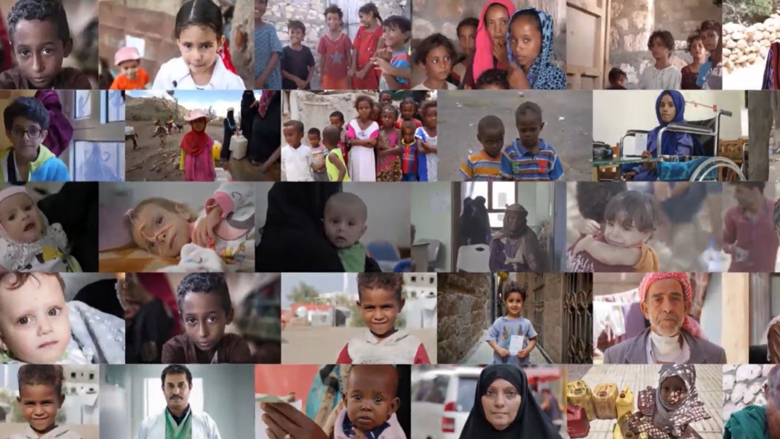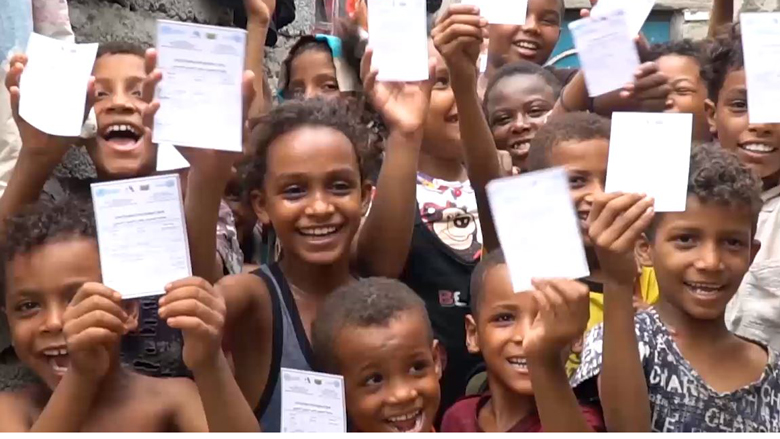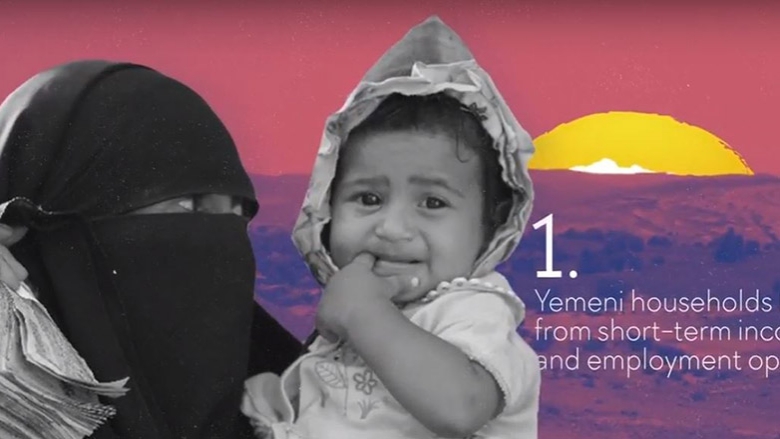Emergency Health and Nutrition Project
Amid the Conflict in Yemen, Mass Campaigns to End the Threat of Tropical Diseases Continue
This project represents a critical opportunity to decrease the disease burden among vulnerable Yemenis, particularly children.
Date: December 6, 2021Type: Feature StoryLanguage: English
Standing by Yemeni People During Conflict
Funding from the World Bank’s IDA is channeled through the UN’s Children’s Fund and the World Health Organization into the Emergency Health and Nutrition Project to support about 1,970 primary health care facilities and 72 hospitals across Yemen.
Date: April 16, 2020Type: Feature StoryLanguage: English
New US$400 Million Grant for Yemen to Address Food Security and Sustain Health, Water and Sanitation Services
The World Bank approved US$400 million in grants for Yemen to address rising rates of malnutrition and to contribute towards maintaining basic health, water and sanitation services. The Board of Directors also discussed new engagement strategy for Yemen.
Date: May 14, 2019Type: Press ReleaseLanguage: English
Coping with Risks in Yemen While Providing Hope
The World Bank has worked tirelessly with UNICEF and WHO to ensure a timely response to the prevailing cholera outbreak. The IDA funded grant provided improved water services in cholera-affected areas to 1.6 million people.
Date: January 15, 2019Type: Feature StoryLanguage: English
Making a Difference: Delivering Services for Yemeni People During Conflict
A conflict-linked cholera epidemic has caused 900,000 suspected infection cases in Yemen, 35% of them among children while nearly 400,000 children are suffering from acute malnutrition.
Date: February 13, 2018Type: Feature StoryLanguage: English
World Bank Mobilizes US$200 Million to Combat Cholera in Yemen
New emergency grant to support health, water and sanitation services to boost treatment of cholera and prevent future outbreaks in Yemen. Kristalina Georgieva World Bank CEO Chief Executive Officer IDA IBRD WB
Date: August 28, 2017Type: Press ReleaseLanguage: English
Yemen: Emergency Health and Nutrition Project - Second Additional Financing and Restructuring
The project will contribute to the provision of basic health and essential nutrition, water and sanitation services for the benefit of the population of the Republic of Yemen.
Date: August 25, 2017Type: Loans & CreditsLanguage: English
New World Bank Support to Address Food Insecurity in Yemen Aims to Reach 9 Million Yemenis
In response to rising food insecurity in Yemen, the World Bank will finance cash transfers to 1.5 million of the poorest households (or about 8 million people), to ensure they have the means to purchase food.
Date: May 19, 2017Type: Press ReleaseLanguage: English
UNICEF and WHO – Yemen Emergency Health and Nutrition Project
The project objective is to contribute to the provision of basic health and essential nutrition services for the benefit of the population of the Republic of Yemen.
Date: January 17, 2017Type: Loans & CreditsLanguage: English
Preserving Institutions in Yemen that Help People Now and Will Be Vital for Future Recovery
The World Bank has managed to leverage its longstanding partnership with two Yemeni institutions to support the most vulnerable despite the conflict, and now expanding its programs to reach the entire country.
Date: January 17, 2017Type: Feature StoryLanguage: English

انقاذ الأرواح من خلال حماية الخدمات الصحية الأساسية في اليمن
من خلال المشروع الطارئ للصحة والتغذية، ساهم كُل من البنك الدولي واليونيسف ومنظمة الصحة العالمية في جعل الرعاية الصحية في متناول الملايين بما يسهم في تحسين وتعزيز رأس المال البشري للمستقبل - مستقبل اليمن.
Date: February 4, 2021Type: VideoLanguage: Arabic

Saving Lives by Protecting Essential Health Services in Yemen
Through the Emergency Health and Nutrition Project, the World Bank, UNICEF, and WHO have made health care accessible for millions.
Date: February 4, 2021Type: VideoLanguage: English

Making a Difference: Delivering Services for Yemeni People During Conflict
In Yemen, the Human Capital gap is widening. In 2019, The number of people in acute need raised by 27% compared with the year before. 19.7 million people desperately require access to healthcare while nearly half of the health facilities are not functioning.
Date: February 27, 2020Type: VideoLanguage: English
Helping to Revive Yemen’s Economy During Crisis
The program is helping to revive Yemen's economy through large “Cash4Work” projects and supporting small businesses.
Date: November 28, 2017Type: VideoLanguage: English
